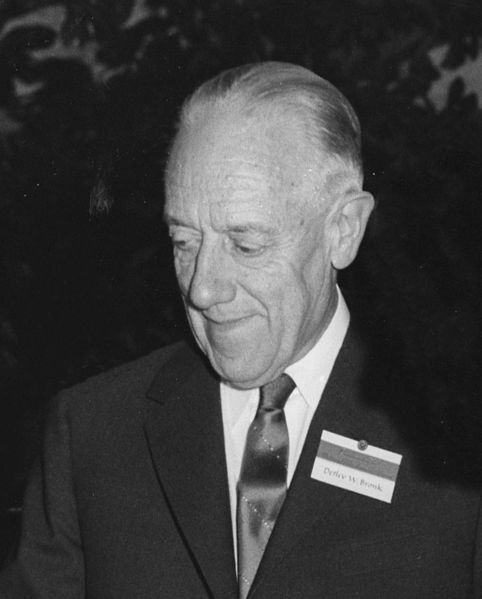Detlev
Wulf Bronk (August 13, 1897 – November 17, 1975)
was a prominent American scientist, educator, and administrator.
He is credited with establishing biophysics as a recognized
discipline. Bronk served as President of Johns Hopkins
University from 1949 to 1953 and as President of the The
Rockefeller University from 1953 to 1968. Bronk also held
the presidency of the National Academy of Sciences between
1950 and 1962.

Bronk
in 1963
Career
From
1953–1968 Bronk was president of The Rockefeller
University. (The Rockefeller Institute for Medical Research
was renamed The Rockefeller University in 1965). He firmly
espoused academic freedom and resisted attempts by Wisconsin
Senator Joseph McCarthy to have Johns Hopkins University
dismiss Professor Owen Lattimore. The same year he was
awarded the Public Welfare Medal from the National Academy
of Sciences.[16] He was credited with formulating the
modern theory of the science of biophysics.[17] Bronk
was awarded the Presidential Medal of Freedom by President
Lyndon B. Johnson on September 14, 1964. He was also a
member of the National Aeronautics and Space council.
He was a member of the Scientific Advisory Committee of
the Brookhaven National Laboratories and a founder and
President of the World Academy of Art and Science (WAAS).
He was also an advisory member of the Atomic Energy Commission.
He served on the board of trustees for Science Service,
now known as Society for Science & the Public, from
1965–1967. Bronk is quoted as saying:
"A
great deal of undergraduate education is built on ...
telling a student what to do—at the very time he
is developing intellectual habits for life. Too rarely
is a student told, 'This is the problem with which we
are going to deal. Here are the books.' "
Source:
http://en.wikipedia.org/wiki/Detlev_Bronk
